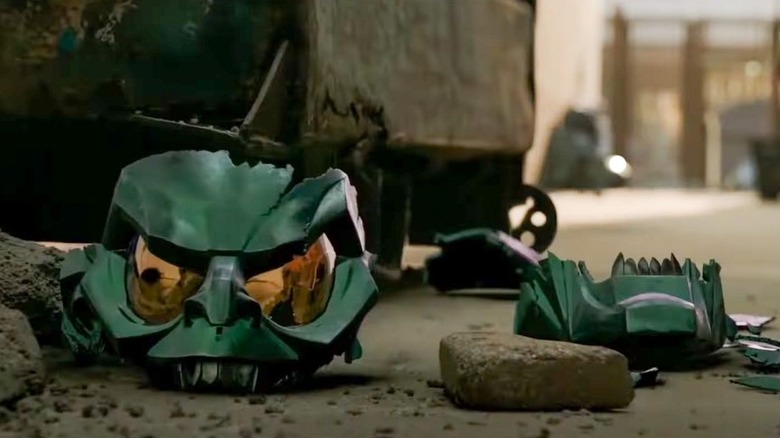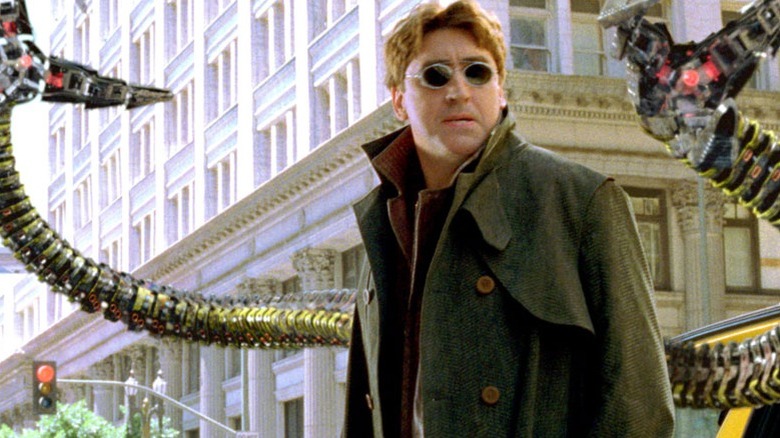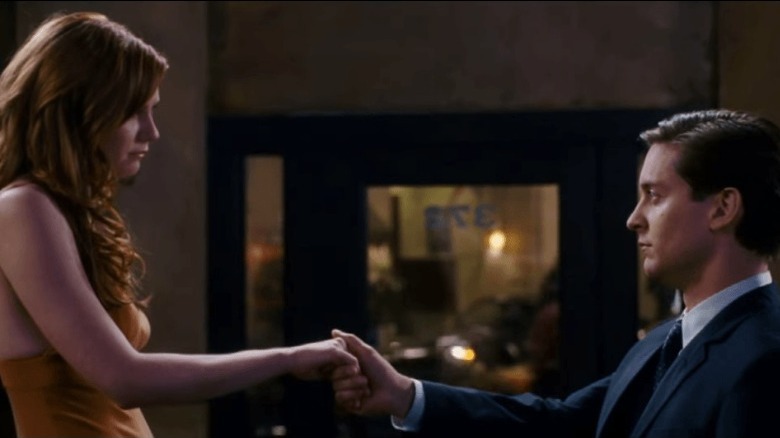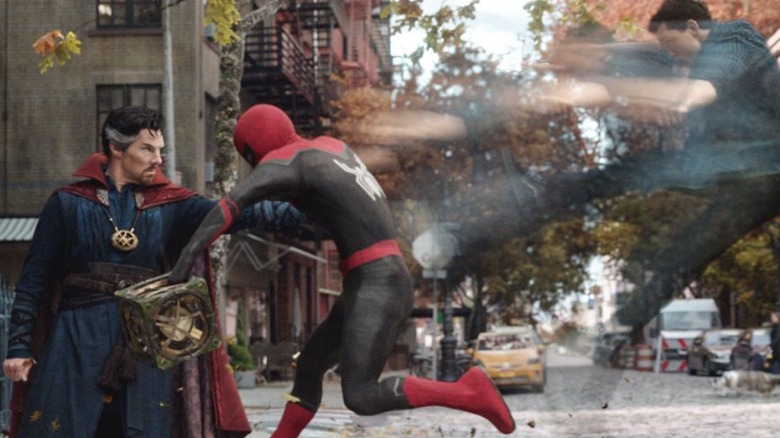Wait, Did Spider-Man: No Way Home Just Mess With Sam Raimi's Spider-Man Trilogy?
If you've already cried your way through "Spider-Man: No Way Home" in theaters this weekend, you might find yourself with some questions once the tears dry. The third Marvel Cinematic Universe "Spider-Man" movie is thrilling, heartbreaking, and full of cheer-inspiring surprises, but it also deals with some pretty lofty concepts. The major spoilers begin now.
The movie builds a multiverse on a wish, then reverses course, then throws a spell-based memory wipe on top of it. There's a lot to keep track of, and after all is said and done, it's hard not to wonder what implications this all has on past Spider-Man universes. Particularly, we're worried about Sam Raimi's untouchable original trilogy.
Aunt May (Marisa Tomei) would probably say that any little bit of good is worth doing, even if you can't see the end result. Still, since "Spider-Man: No Way Home" is built around the idea of curing the mad scientist villains of Spider-Man movies past, we can't help but wonder what that concept might look like once the reformed bad guys return home.
The Villains Get A Hard Reboot
After much strife and some surprising bloodshed, the trio of Peter Parkers (Tom Holland, Andrew Garfield, and Tobey Maguire) featured in "Spider-Man: No Way Home" are able to essentially reset the villains who have broken through to the MCU universe. Dr. Otto Octavius (Alfred Molina), Norman Osborn (Willem Dafoe), Maxwell Dillon (Jamie Foxx), Flint Marko (Thomas Hayden Church), and Dr. Curt Connors (Rhys Ifans) aren't inherently evil, as May points out. They all crossed over to the dark side thanks to science gone wrong. So it's not totally unreasonable to think that their fortunes could be reversed by some STEM-savvy kids with access to a science lab.
At the end of "Spider-Man: No Way Home," the villains are successfully cured and sent back to their own timelines. We have some lingering questions, though, about how much any of this inter-universe intervention will ultimately help them. The villains were transported to the MCU directly after we last saw them, meaning they crossed over in the moments before their deaths. What will it look like for them to return to their home timelines during these key moments?
In theory, this well-intentioned meddling would not only undo the climaxes of each Sam Raimi Spider-Man film, but also make the events of the second and third Raimi films mostly moot. If The Green Goblin doesn't die in front of Peter's eyes, his son Harry (James Franco) won't follow in his footsteps. If Harry doesn't don the black suit, he won't ultimately save Peter and Mary-Jane (Kristen Dunst) during the third film's climax. But that might not matter, because Peter might never end up in that situation in the first place. If Norman Osborn returns to his timeline a changed man, he could salvage his relationship with colleague Dr. Octavius before the latter ever descends into tech-based madness. Thus, we'd be left with most of the first Spider-Man film unchanged, and the rest potentially unraveled.
What We Learned About Raimi's Peter
It's possible to interpret the results of this multiverse experiment differently, or to choose not to consider them at all. Regardless of your position on the matter, "Spider-Man: No Way Home" definitely still makes minor changes to Raimi's Spider-verse through the presence of Tobey Maguire's Peter.
Raimi's Peter appears in "No Way Home" as the super chill, wise elder Spider-Man of the bunch. Unlike his counterparts, we first see him dressed in civilian clothes. Audiences learn that Peter has been able to maintain his secret identity to this day. We also find out, through an all-too-vague reference to a love story fans were once super-invested in, that he ended up making things work in the long run with Mary-Jane. This is a lovely if brief bit of resolution after "Spider-Man 3," which ended with the pair's reconciliatory dance.
Unfortunately, Peter also takes a major hit on his way back to the Raimi-verse. During the final, Statue of Liberty-set confrontation, he's stabbed by the Green Goblin. It's a shocking moment, but thankfully, the movie makes it clear this is just a flesh wound. Peter survives, propped up by Andrew Garfield's Peter, and makes it back to his own universe. He'll have a nice scar to remember this trip by. Unless, of course, MCU Peter's final wish makes that impossible.
So Who Will Remember What?
I've watched enough of "Fairly OddParents" and "The Twilight Zone" to know that when wishing, language needs to be very precise. At the end of "Spider-Man: Far From Home," Tom Holland's Peter fixes the cracks in the multiverse by wishing to Doctor Strange (Benedict Cumberbatch) that everyone would forget Peter Parker exists. This in itself is a devastating solution, one that ultimately leaves him lonely and forgotten while MJ (Zendaya) and Ned (Jacob Batalon) move on to their hopeful futures at MIT. But it gets even more devastating when we stop to consider the cross-universe implications.
Even if we generously assume that MCU Peter is the only one impacted by this spell — as opposed to all Peter Parkers everywhere being forgotten — that could still mean the Peter Parkers he just met will forget the details of what they went through. So will the villains. But before we break out another round of tissues to lament the idea that the other Peters won't get to hold onto the life-changing adventure they just went on, let's consider what the last scenes tell us about the nature of this spell.
In a short, profound moment at the end of "Spider-Man: No Way Home," MCU Peter visits Aunt May's grave, where he bumps into Happy (Jon Favreau). The two say that they both knew May through Spider-Man. This implies that everything Spider-Man has done so far within the MCU still happened exactly as we remember it, except that no one knows it was Peter beneath the mask. Hopefully, the same holds true for the other Peter Parkers. They'll remember the events of "No Way Home," but not recall who was at the center of them aside from Spider-Man himself. Will their excursion be less meaningful if they don't remember the moments of solidarity all three Peters shared, based on who they are? We might never know, but it's a sad thought on top of an already sad ending.
Honestly, we could think about the cross-universe implications of "Spider-Man: No Way Home" forever. I personally will be haunted indefinitely by the fact that there's a more than zero percent chance that MCU Peter's hasty solution could lead to every Peter Parker being forgotten. But this big, bold, heartfelt film doesn't seem to want us to focus on these things. What matters, in the end, is that our heroes united to commit themselves to redemption instead of retribution. That altruistic hopefulness is a wish in itself, and it's one that, at its core, can never go wrong.
"Spider-Man: No Way Home" is currently in theaters.



